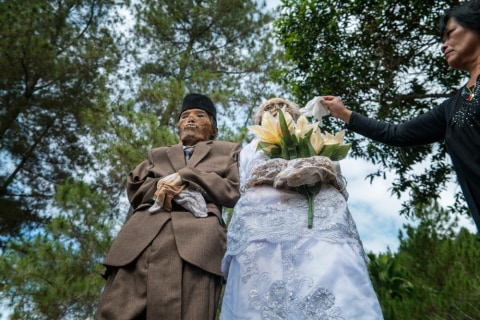The Ma'nene's History - Changing the Clothes of a Corpse in Toraja
 |
| picture by : kumparan.com |
The attraction of tourism that Indonesia has is not only from its natural beauty, the cultural diversity of the archipelago is also an attraction for tourists to come to Indonesia. One of the destinations that you can visit to see the diversity of Indonesian culture is Tana Toraja in South Sulawesi.
Tana Toraja is known to have a rich and unique cultural heritage. One of the most unique traditions in Tana Toraja is Ma'Nene.
This unique and mysterious ritual is an activity to clean the bodies of ancestors who have died hundreds of years ago. Although currently this ritual is rarely performed, some areas, such as Pangala and Baruppu Villages, still routinely carry out this ritual every year.
This ritual ceremony which is held every August is interpreted as the ruler of the kinship between them. In fact, the Ma'Nene ritual has become an unwritten standard rule that is always obeyed by every citizen.
This traditional ritual procession begins with a visit by family members to the ancestral cemetery called Patane. Then family members take the bodies of family members that have been stored for hundreds of years.
Furthermore, after being removed from the grave, the body was cleaned. Then, the clothes used by the body are replaced by using new cloth or clothes.
For men's bodies, neat clothes will be worn, from suits to glasses. Meanwhile, for a woman's body, a wedding dress will be worn. After the new clothes were put on, the bodies were wrapped and put back in Patane.
Then the traditional procession is closed with Sisemba. Sisemba is a moment of gathering between families in the area, which is done by eating together. The food served should not be served carelessly, because it must come from the contribution of each ancestral family.
Usually the Ma'Nene ritual is carried out simultaneously with family members or even one village. In its implementation, Ma'Nene is held every three years. It is intended that relatives who wander can visit and undergo traditional rituals.
The Ma'Nene ritual is not just a ritual of bathing a body and wearing new clothes. This ritual has more meaning, which reflects the importance of the relationship between family members for the Toraja people, especially for relatives who have passed away beforehand.
The history of the Ma'Nene ritual began when an animal hunter named Pong Rumasek lived hundreds of years ago. At that time, he was hunting in the forest of the Balla Mountains.
It is said that in the middle of a hunt, Pong Rumasek, a Toraja resident, found dead human corpses. The body was lying in the middle of the road in a dense forest. His condition was pitiful. The corpse's body was only bones.
Seeing this condition, Pong Rumasek's heart was moved, and he wanted to take care of the corpse. Then, the body was wrapped in the clothes he was wearing. After being deemed safe, Pong Rumasek then continued his hunt.
It is said that since that incident, whenever Pong hunts an animal, he always finds it easy, including fruit in the forest. Another strange thing happened. When Pong Rumasek came home, suddenly his crops were abundant, his plantation was harvesting faster than expected.
Since then, every time he hunts in the forest, Pong always meets the spirits of the dead whom he has cared for. In fact, his mind was often invited to hunt grazed animals. At that time, Pong Rumasek thought that the bodies of people who had died should still be glorified, even if they were only bones.
Because of the history of Pong Rumasek, after the harvest in August, every Baruppu resident always holds a Ma`Nene ritual, a funeral ceremony to honor his ancestor, Pong Rumasek.